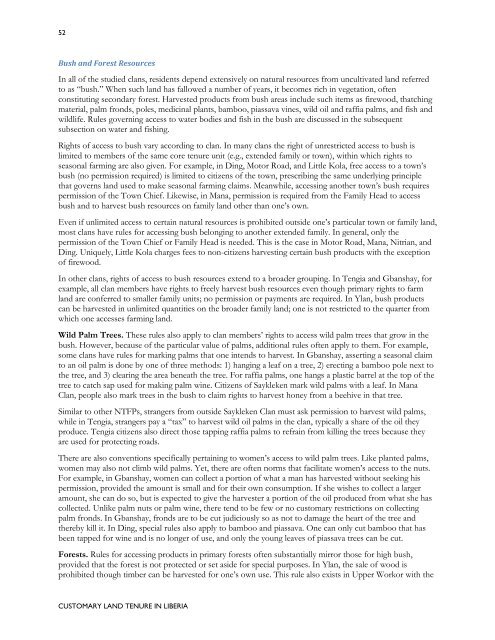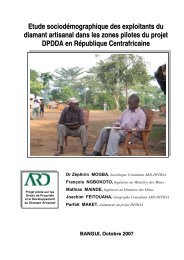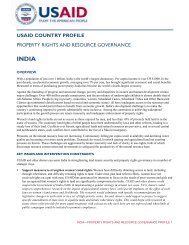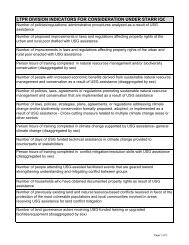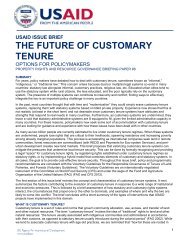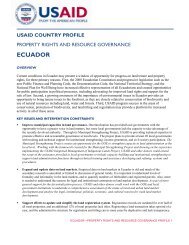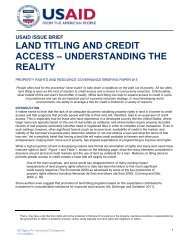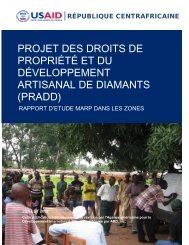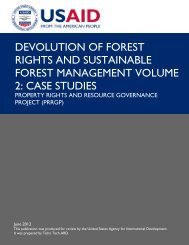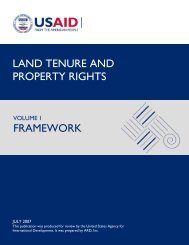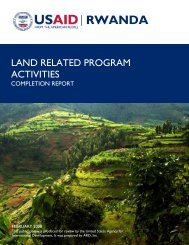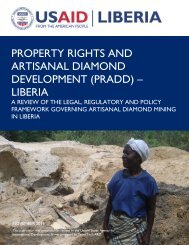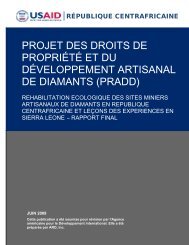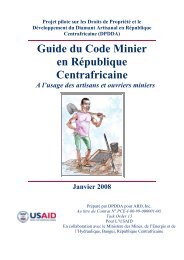Customary Land Tenure in Liberia - Land Tenure and Property ...
Customary Land Tenure in Liberia - Land Tenure and Property ...
Customary Land Tenure in Liberia - Land Tenure and Property ...
You also want an ePaper? Increase the reach of your titles
YUMPU automatically turns print PDFs into web optimized ePapers that Google loves.
52<br />
Bush <strong>and</strong> Forest Resources<br />
In all of the studied clans, residents depend extensively on natural resources from uncultivated l<strong>and</strong> referred<br />
to as “bush.” When such l<strong>and</strong> has fallowed a number of years, it becomes rich <strong>in</strong> vegetation, often<br />
constitut<strong>in</strong>g secondary forest. Harvested products from bush areas <strong>in</strong>clude such items as firewood, thatch<strong>in</strong>g<br />
material, palm fronds, poles, medic<strong>in</strong>al plants, bamboo, piassava v<strong>in</strong>es, wild oil <strong>and</strong> raffia palms, <strong>and</strong> fish <strong>and</strong><br />
wildlife. Rules govern<strong>in</strong>g access to water bodies <strong>and</strong> fish <strong>in</strong> the bush are discussed <strong>in</strong> the subsequent<br />
subsection on water <strong>and</strong> fish<strong>in</strong>g.<br />
Rights of access to bush vary accord<strong>in</strong>g to clan. In many clans the right of unrestricted access to bush is<br />
limited to members of the same core tenure unit (e.g., extended family or town), with<strong>in</strong> which rights to<br />
seasonal farm<strong>in</strong>g are also given. For example, <strong>in</strong> D<strong>in</strong>g, Motor Road, <strong>and</strong> Little Kola, free access to a town‟s<br />
bush (no permission required) is limited to citizens of the town, prescrib<strong>in</strong>g the same underly<strong>in</strong>g pr<strong>in</strong>ciple<br />
that governs l<strong>and</strong> used to make seasonal farm<strong>in</strong>g claims. Meanwhile, access<strong>in</strong>g another town‟s bush requires<br />
permission of the Town Chief. Likewise, <strong>in</strong> Mana, permission is required from the Family Head to access<br />
bush <strong>and</strong> to harvest bush resources on family l<strong>and</strong> other than one‟s own.<br />
Even if unlimited access to certa<strong>in</strong> natural resources is prohibited outside one‟s particular town or family l<strong>and</strong>,<br />
most clans have rules for access<strong>in</strong>g bush belong<strong>in</strong>g to another extended family. In general, only the<br />
permission of the Town Chief or Family Head is needed. This is the case <strong>in</strong> Motor Road, Mana, Nitrian, <strong>and</strong><br />
D<strong>in</strong>g. Uniquely, Little Kola charges fees to non-citizens harvest<strong>in</strong>g certa<strong>in</strong> bush products with the exception<br />
of firewood.<br />
In other clans, rights of access to bush resources extend to a broader group<strong>in</strong>g. In Tengia <strong>and</strong> Gbanshay, for<br />
example, all clan members have rights to freely harvest bush resources even though primary rights to farm<br />
l<strong>and</strong> are conferred to smaller family units; no permission or payments are required. In Ylan, bush products<br />
can be harvested <strong>in</strong> unlimited quantities on the broader family l<strong>and</strong>; one is not restricted to the quarter from<br />
which one accesses farm<strong>in</strong>g l<strong>and</strong>.<br />
Wild Palm Trees. These rules also apply to clan members‟ rights to access wild palm trees that grow <strong>in</strong> the<br />
bush. However, because of the particular value of palms, additional rules often apply to them. For example,<br />
some clans have rules for mark<strong>in</strong>g palms that one <strong>in</strong>tends to harvest. In Gbanshay, assert<strong>in</strong>g a seasonal claim<br />
to an oil palm is done by one of three methods: 1) hang<strong>in</strong>g a leaf on a tree, 2) erect<strong>in</strong>g a bamboo pole next to<br />
the tree, <strong>and</strong> 3) clear<strong>in</strong>g the area beneath the tree. For raffia palms, one hangs a plastic barrel at the top of the<br />
tree to catch sap used for mak<strong>in</strong>g palm w<strong>in</strong>e. Citizens of Saykleken mark wild palms with a leaf. In Mana<br />
Clan, people also mark trees <strong>in</strong> the bush to claim rights to harvest honey from a beehive <strong>in</strong> that tree.<br />
Similar to other NTFPs, strangers from outside Saykleken Clan must ask permission to harvest wild palms,<br />
while <strong>in</strong> Tengia, strangers pay a “tax” to harvest wild oil palms <strong>in</strong> the clan, typically a share of the oil they<br />
produce. Tengia citizens also direct those tapp<strong>in</strong>g raffia palms to refra<strong>in</strong> from kill<strong>in</strong>g the trees because they<br />
are used for protect<strong>in</strong>g roads.<br />
There are also conventions specifically perta<strong>in</strong><strong>in</strong>g to women‟s access to wild palm trees. Like planted palms,<br />
women may also not climb wild palms. Yet, there are often norms that facilitate women‟s access to the nuts.<br />
For example, <strong>in</strong> Gbanshay, women can collect a portion of what a man has harvested without seek<strong>in</strong>g his<br />
permission, provided the amount is small <strong>and</strong> for their own consumption. If she wishes to collect a larger<br />
amount, she can do so, but is expected to give the harvester a portion of the oil produced from what she has<br />
collected. Unlike palm nuts or palm w<strong>in</strong>e, there tend to be few or no customary restrictions on collect<strong>in</strong>g<br />
palm fronds. In Gbanshay, fronds are to be cut judiciously so as not to damage the heart of the tree <strong>and</strong><br />
thereby kill it. In D<strong>in</strong>g, special rules also apply to bamboo <strong>and</strong> piassava. One can only cut bamboo that has<br />
been tapped for w<strong>in</strong>e <strong>and</strong> is no longer of use, <strong>and</strong> only the young leaves of piassava trees can be cut.<br />
Forests. Rules for access<strong>in</strong>g products <strong>in</strong> primary forests often substantially mirror those for high bush,<br />
provided that the forest is not protected or set aside for special purposes. In Ylan, the sale of wood is<br />
prohibited though timber can be harvested for one‟s own use. This rule also exists <strong>in</strong> Upper Workor with the<br />
CUSTOMARY LAND TENURE IN LIBERIA


